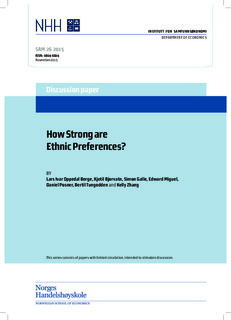| dc.description.abstract | Ethnic divisions have been shown to adversely affect economic performance and political stability, especially in Africa, but the underlying reasons remain contested, with multiple mechanisms potentially playing a role. We utilize lab experiments to isolate the role of one such mechanism—ethnic preferences—which have been central in both theory and in the conventional wisdom about the impact of ethnic differences. We employ an unusually rich research design, collecting multiple rounds of experimental data with a large sample of 1,300 subjects in Nairobi; employing within-lab priming conditions; and utilizing both standard and novel experimental measures, including implicit association tests. The econometric approach was pre-specified in a registered pre-analysis plan. Most of our tests yield no evidence of coethnic bias. The results run strongly against the common presumption of extensive ethnic bias among ordinary Kenyans, and suggest that other mechanisms may be more important in explaining the negative association between ethnic diversity and economic and political outcomes. | nb_NO |
